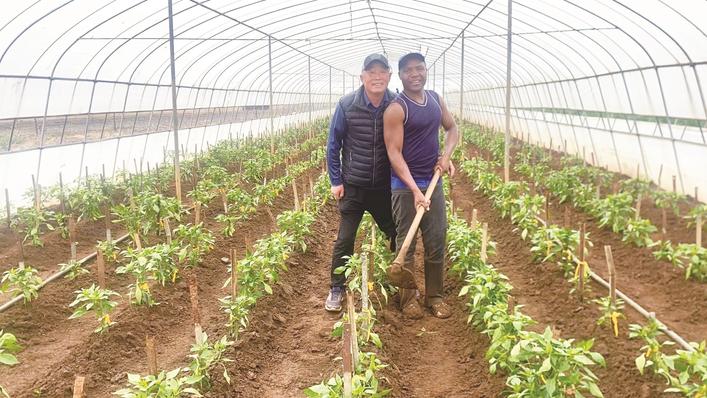By Huang Hai
he Third ‘Belt and Road’ Forum for International Cooperation which was held from 17th to 18th October elated and inspired Li Weichong, a farmer of Lao Li Farm far away in South Africa. Have been in South Africa for 20 years, and taken the express train of the ‘Belt and Road’ Initiative, close to 20 people of Li’s family have settled here.
Li Weichong is from Lugang Village, Jinhai Town, Qidong. In 2003, he and his fourth brother, Li Jinchong, became the first batch of ‘those who go abroad’, and started to sell tofu in South Africa. Later they planted vegetables and started a farm. Since South Africa joined the ‘Belt and Road’ Initiative in 2015, Lao Li Farm has been famous in the local Chinese community. ‘There was never enough to sell.’
In 2003, Li Jinchong, who went to South Africa to make tofu before Li Weichong, did not get salary from his boss, so he asked for help from Li Weichong. In that April, Li Weichong went to the foreign country. The boss mortgaged the tofu shop to the two brothers. As the tofu made by them was delicious and of high quality, it was loved by the Chinese people and overseas Chinese. The brand ‘Lao Li Tofu’ was also recognized by customers in South Africa and nearby countries.
In 2007, with the savings obtained from selling tofu, the two brothers bought the farm with 1.3 million South Africa Rands (equivalent to about 160 thousand U.S. dollars) from an elderly British couple. The farm covered an area of 208 acres. It is located at more than 50 km east to Johannesburg.
Similar to the nearby South African farms, the Li brothers’ farm only grew corn, potato and sweet potato at first. However, staying in a foreign county, what they missed most was the ‘Chinese delicacy’. The two brothers tried to plant some vegetables in front of and behind the house, apart from making tofu. The trial led to new discoveries: canola, Chinese cabbage, radish, towel gourd, eggplant...no matter what type of vegetable it is, as long as it was planted, it could grow.
And then, the farm was getting ‘sinicized’ gradually, cucumber, eggplant, long bean, Chinese yam...were introduced. Now, the farm has in total more than 80 greenhouses, and more than 40 types of vegetables were planted, which made it the largest green vegetable base in South Africa, meeting the demand for the original material of food of local Chinese.
As China and South Africa increased depth in cooperation and exchange, more and more Chinese have been doing business in South Africa. Hence, the demand exceeded supply for the vegetables of the farm. The 3 stores of Lao Li Farm in the Chinatown were always crowded. During the period, the life of the Li’s family was improved a lot because of the ‘Belt and Road’. Close to 20 siblings came to ‘dig gold’ one after another.
Many Chinese who have plants and restaurants in South Africa became long-term customers of Lao Li Farm. Lao Li Farm also became the major supplier of Chinese characteristic vegetables in various major cities of South Africa and nearby countries such as Lesotho and Botswana. Even Embassy of China in Johannesburg was ‘attracted as a fan’ successfully.
September and October are in the spring of South Africa. It was a hive of activity planting and harvesting in Lao Li Farm. More than 40 workers from Zimbabwe, Mozambique, Kenya, and South Africa, together with the Li brothers, were busy working. The workers not only can plant vegetables, but also can speak Chinese.
Over the years, the Li brothers lived in harmony with local people. ‘To interact with hearts, then you can make good friends and true friends.’ Li Weichong said.



